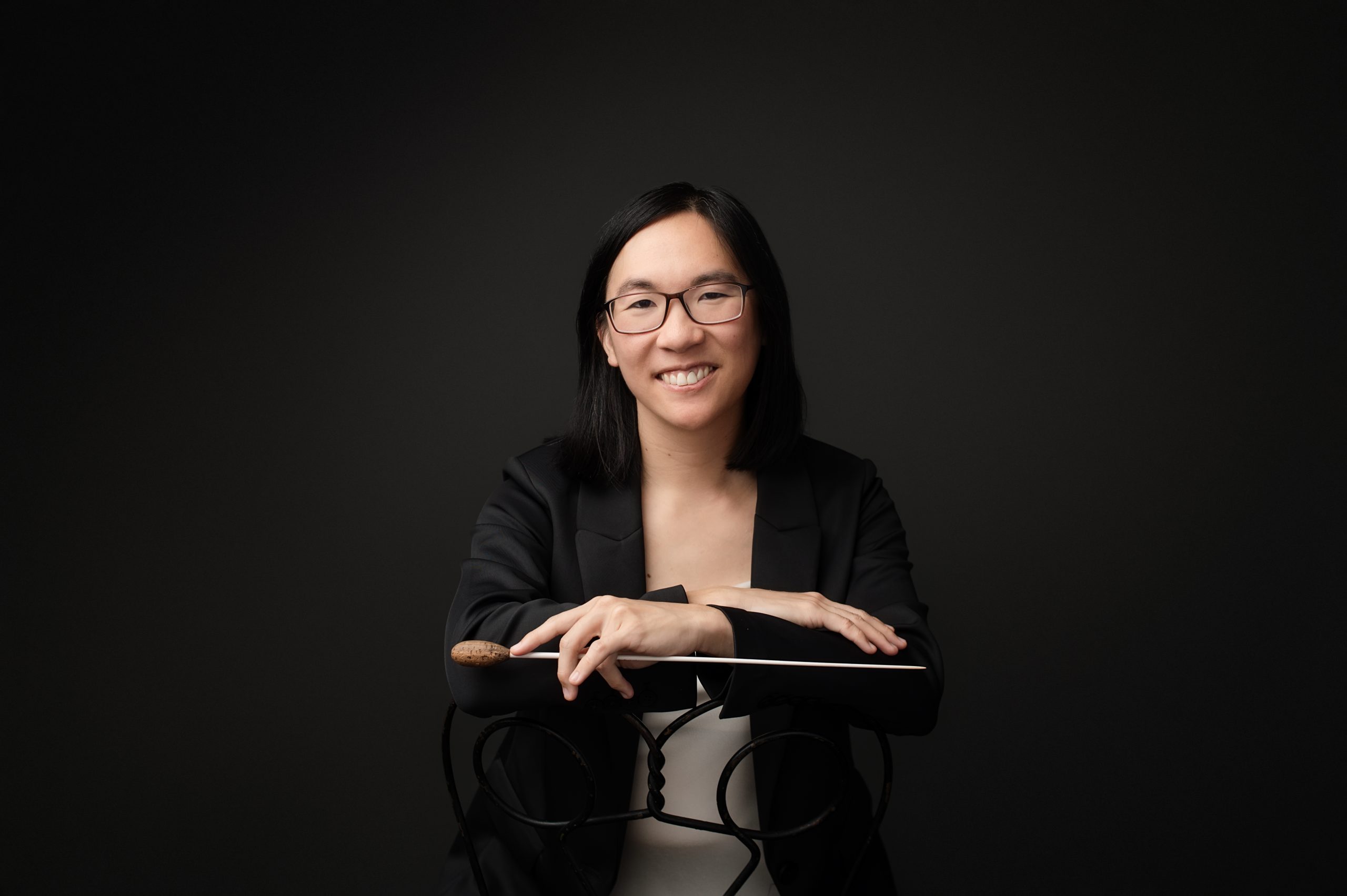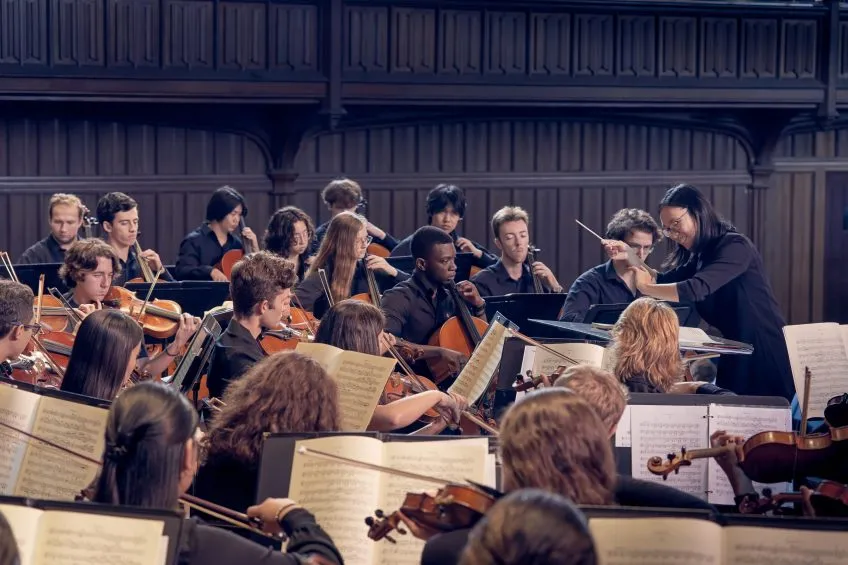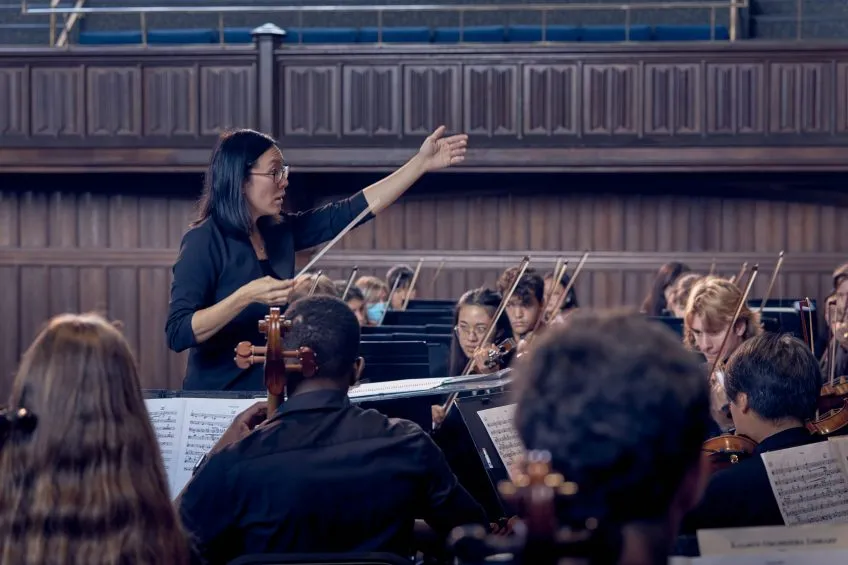UF School of Music welcomes Tiffany Lu as its new Director of Orchestra

When a symphony orchestra comes together in concert, the result of 100 or more musicians meeting each other in the herculean task to create a unified sound, a cliché evoked far too often in their praise is: “well oiled machine.”
It is for this reason that conductors like Tiffany Lu, DMA, who joined the University of Florida School of Music as its new Director of Orchestra this fall, are so refreshing to meet.
Like any skilled conductor or mechanic: Lu has a knack for the meticulous arrangement of individual parts that make a humming engine whole, and a respect for precision and the time-tested traditions of the craft at hand. As a leader, Lu is willing to roll up her sleeves and muck around under the hood alongside her apprentices. Artistically, she relishes opportunities to be creative — and as an educator, adheres to a “learn the rules, and learn them well, so you can break them later” philosophy.
You’re as likely to find Lu arriving early to rehearsal to help undergraduates who are new to the large ensemble experience set the room as you are to overhear her after a concert, explaining to a curious audience member why ensembles are arranged just so.
Of the former, Lu says it’s her responsibility to teach students the ropes of the professional world — how “the puzzle” of assembling an orchestra works. Of the latter, she notes: there’s a reason an orchestra, much like an engine block, is built this way it is.
“You can get very artistic, but for every one of those ‘creative vision’ types of performances, that’s a ten-fold investment in rehearsal time,” Lu says, adding:
“The orchestra is a formatted experience. With anything that changes that, you have to make sure there’s a good reason for it and a way that it can be done. It’s worth giving people as much of a peek behind the curtain as possible so that they understand why we have such loyalty to the integrity of this format that has risen over the centuries.”
For Lu, the human element embodied by each musician in a symphony orchestra transcends any comparison to machine. In her view: at its core, an ensemble of such magnitude is driven by the joy of taking part in it. That joy, and the skills essential to the collaborative, civic effort that goes into making music as a large ensemble, are what Lu hopes the students who pass through her orchestra will carry with them beyond their years at the University of Florida.
“What draws the line between UF and, say, a conservatory, is that half of this group are actually not music majors, so they don’t necessarily care how it works in the professional world. They have had access in their past to joyful orchestral experiences and they want more of those,” Lu says.
“You just have to figure out a way to make those things dovetail, which I think they do quite naturally. That’s the mission.”

Re-drawing a career blueprint: from public policy to orchestral conducting
Lu grew up in the Tampa Bay area, where she began playing the violin at age three under the instruction of her mother, Yan Jiang Lu, a violinist with the Florida Orchestra and strings teacher.
Lu notes that she also practiced piano from early childhood through high school but says her music practice during those years was never geared toward a professional career.
“I didn’t think I was going to be a musician. At first, it was one of those ‘looks good on the college applications’ things. But I really cared about it. Music was always my thing growing up,” Lu says.
It was while Lu was attending Princeton University, where she earned her undergraduate degree in public policy, that she realized just how deeply rooted was her passion for music.
“I couldn’t shape [a public policy] degree in a way that made any sense to me, and as a result, I ended up spending all my spare time in the music building, playing the violin. In fact, I did everything that was possible to do with music from a classical standpoint at Princeton — such that, by the time I graduated, I thought, ‘I don’t know what I’m going to do with this public policy degree,’” she recalls.
But without the density of formal training that accompanies a degree in music, Lu says the path from public policy to violin performance as a career felt unrealistic in a time when professional musicians inhabit highly competitive and increasingly specialized roles.
“I was looking at a landscape where I was several thousand hours of practice behind my peers who would have done conservatory training on the violin. So, I thought: I would love to put what I think are considerable other gifts to use, in addition to having a performing career. That’s when conducting started to emerge as a possibility,” Lu says.
“The problem with getting into conducting,” she adds, “is that there’s no standard path. That’s a result of there being many ways in, but not a particularly high demand-to-supply ratio … In every orchestra of 100 people, you need one conductor.”
With her focus attuned to a new goal, Lu tallied her lifetime of extracurricular experiences in “doing everything that was possible with music” and turned up the dial — performing in ensembles, attending every rehearsal possible; private lessons, asking musicians to play for her, and brushing up on theory — for two years before the path toward graduate conducting felt less murky.
“To this day, I consider my violin playing career to have been my first and foremost important experience. That is: many, many hours; many, many rehearsals worth of understanding and thinking about what happens when a conductor is running a rehearsal,” Lu says.
Lu went on to pursue her graduate studies in Orchestral Conducting, earning her MM from Ithaca College and DMA from the University of Maryland.
She served as the music director of the University of Maryland Repertoire Orchestra, and assistant conductor of the University of Maryland Symphony Orchestra and the Maryland Opera Studio. During her years in the D.C. area, Lu was also music director of the Wilmington Community Orchestra, assistant conductor with the Capital City Symphony, and was selected as conducting fellow for the Allentown Symphony in 2019 and 2020.
In 2020-2022, Lu served as Director of the Sewanee Symphony Orchestra and assistant professor of Orchestral Conducting at Sewanee University of the South, before arriving in her new role at UF this fall.
“I was very lucky to land [the job at Sewanee] because it was only a year after I graduated with my doctorate, and it was right at the beginning of the pandemic. It was a great jumpstart for me! But this is the dream job,” Lu says.
Tinkering, assembling the ‘fun and thorny puzzle’ of a large ensemble
Lu says her background in public policy comes in handy with the administrative aspects of running a student orchestra, noting that it’s “such a fun, and potentially a thorny puzzle.”
She approaches the role in hands-on manner to help undergrads who are joining their first full-size orchestra acclimate: detailed mass emails covering the ins-and-outs of professional-level concert expectations, showing up early to help with the “heavy operational lift” of setting up, and ensuring a repertoire that provides an experience to everyone in the ensemble — which is apt to change as students cycle through their time at the university.
“Conducting is itself a crossover field. I think people think that conducting is like dancing — you can make connections to all sorts of musical and artistic fields. But I would say that a good fifty percent of conducting is administrative. The fun part is running rehearsals and getting to perform with a group, which is what people who go into the conducting field think they’re going to be doing most of the time,” Lu says.
“But in that other fifty percent, every bit is important … especially at this level, where students are just learning to be professional,” she adds.
And in a university setting, Lu notes, there are curricular aspects to cover — Bach, Beethoven, Mozart, the Viennese Symphonic tradition; something “hefty and Romantic;” a splash of contemporary music and “new, intricate rhythms.”

“Range is important from an educational standpoint. It means you have to cover all those things in the course of their education. You owe it to students, at some point, to put some concerti in front of them — because that’s a different working experience, too,” Lu says.
But the fun part is: “you get to think about how you’re going to create an actual live experience. You get to think about the order and the substance, and what you say about those things. That has quite a lot of potential for creativity — I think more than the general field sometimes gives it credit,” Lu says.
“You get to consider things like: do I want the concert experience for the audience to be a certain way? Is there a particular recent event that I want to examine through the lens of various pieces? Is there a theme that I can find between pieces?”
Lu notes that for some conductors, hitting the books to arrange a score is the most thrilling part of the job. But for Lu, the magic moment comes when she’s with her orchestra; in a room full of musicians who are creating that moment together.
“A lot of conductors will say things like, ‘I enjoy studying. I love delving into the score and getting deep into it, opening up its layers,’ but I like working with people. That’s where it is for me,” Lu says.
“I am a bit of a loner, but I think if I’m going to do something and make it worthwhile, it’s the rehearsal and concert experience. For me, studying is what I kind of ‘get through’ to get to those moments.”
Centering a more civic approach to orchestra
The UF Symphony Orchestra held its first performance of the 2022-23 season in October. Although Hurricane Ian disrupted the orchestra’s rehearsal schedule leading up to the concert, Lu says the musicians accomplished considerable success.
“We had a really strong opening performance,” Lu says. “There was a positive atmosphere in the room and a very supportive audience, with a great showing from my colleagues and from the students’ families. And it’s my opinion that we hit, in terms of potential, about eighty-five percent — which is exciting, because it leaves a lot of room to grow.”
For Lu, that additional 15 percent isn’t an indication of a machine that needs a tune-up. It’s a thrilling opportunity for a young orchestra to coalesce into a more unified sound as its musicians grow their strengths by listening to each other and learning how to “broadcast intention” as a collective.
“There is a cynicism that you’ll find in the professional world that I’m working against: it’s this idea that you just do what’s on the pages in front of you … And that’s my dotted line. That’s a very un-civic approach to orchestra and to life at large,” Lu says.
“Students come with their set of abilities, which have mostly been honed in the practice room with their teacher; maybe with chamber groups — but nobody has a large ensemble they can just pull out and practice with. So, what are the skills they learn by being in a large ensemble?
It’s listening. It’s listening the same way that you would listen in chamber — but on a larger scale.”
She explains:
“They have to understand how to broadcast intention and role within a larger context. I want them to hone their instincts and their skills in such a way that matters in a room full of people … As long as they know who they are supposed to be listening to, and they try to listen to them — then their instincts will carry them the rest of the way there.”
Looking ahead with the University Symphony Orchestra and UF School of Music
As she settles into her new role at UF, Lu says she looks forward to the upcoming production of ‘Carmen’ in spring.
“That’s a big experience. I’ll be music directing a full-scale opera, which is not something I’ve done before — so I’m very, very excited about that, and about working with the opera studio here,” Lu says.
She’s also preparing to take on her first graduate conducting studio at UF and will craft a Quest course to launch in the following spring.
“That will take me back into more academic territory, which is, incidentally, what I was doing when I was at Sewanee. It’s not uncharted territory for me, except in the sense that I will be developing the course myself — which I’m also very excited about,” she says.
In the meantime, Lu is delighting in getting to know and being part of the UF Symphony Orchestra, and being close to her family, once again, in her home state of Florida.
Visit the UF Symphony Orchestra website for more info on the orchestra and upcoming performances.
The UF Symphony Orchestra set the tone for a festive holiday season at the 74th annual Sounds of the Season concert on December 4. The next concert of the 2022-23 season under Lu’s conductorship will take place on February 16, 2023 at the University Auditorium.

Featured Image Caption: Conductor Tiffany Lu joined the University of Florida Symphony Orchestra as its new director this fall.